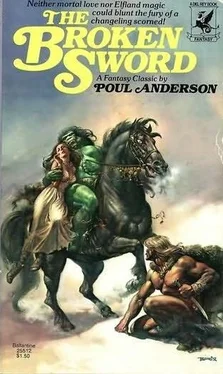Poul Anderson - The Broken Sword
Здесь есть возможность читать онлайн «Poul Anderson - The Broken Sword» весь текст электронной книги совершенно бесплатно (целиком полную версию без сокращений). В некоторых случаях можно слушать аудио, скачать через торрент в формате fb2 и присутствует краткое содержание. Жанр: Фэнтези, на английском языке. Описание произведения, (предисловие) а так же отзывы посетителей доступны на портале библиотеки ЛибКат.
- Название:The Broken Sword
- Автор:
- Жанр:
- Год:неизвестен
- ISBN:нет данных
- Рейтинг книги:3 / 5. Голосов: 1
-
Избранное:Добавить в избранное
- Отзывы:
-
Ваша оценка:
- 60
- 1
- 2
- 3
- 4
- 5
The Broken Sword: краткое содержание, описание и аннотация
Предлагаем к чтению аннотацию, описание, краткое содержание или предисловие (зависит от того, что написал сам автор книги «The Broken Sword»). Если вы не нашли необходимую информацию о книге — напишите в комментариях, мы постараемся отыскать её.
The Broken Sword — читать онлайн бесплатно полную книгу (весь текст) целиком
Ниже представлен текст книги, разбитый по страницам. Система сохранения места последней прочитанной страницы, позволяет с удобством читать онлайн бесплатно книгу «The Broken Sword», без необходимости каждый раз заново искать на чём Вы остановились. Поставьте закладку, и сможете в любой момент перейти на страницу, на которой закончили чтение.
Интервал:
Закладка:
The Broken Sword
Poul Anderson
Foreword
Late in the year of Our Lord 1018, Sighvat Thordarson fared through Gotaland on an errand for King Olaf of Norway. Most folk thereabouts still worshipped in the old way. The wife at one lonely steading would not let him and his friends spend the night because an Aljarblot was being readied. Any well-brought-up man in those days could make a stave at any time; and Sighvat was a skald. Quoth he:
“That Odin be not angered, keep off!” the woman said. “We’re heathen here and holding a holy eve, you wretch!” The carline who unchristianly cast me from this garth gave out that they would offer at evening to the elves.
So the tale goes in Snorri Sturlason’s Heimskringla. Elsewhere we read that the dragon heads were removed from warships when they neared home, lest the elves take offence. In such ways we see these beings for what they were in the beginning: gods.
Of course, by the time men in the North started writing books, the elves had dwindled to mere tutelaries, like the Greek dryads or the kami of some river in Japan. The Eddas put various of them in Asgard as attendants of the Aisir. But the word is used for two different races, who hold two of the Nine Worlds. Alfheim belongs to the tall, fair “light elves.” Though we are not altogether sure of it, most likely Svartalfheim, whose name means “home of the dark elves,” is where the dwarfs live. It is interesting to note how much more important the latter are in what stories have come down to us.
Later folklore diminished the elves further, making them nothing but sprites, shrinking their very size, and forgetting their kinship with the still potent dwarfs. Nevertheless a ghost of Alfheim haunted the Middle Ages and Renaissance—the realm of Faerie, whose inhabitants were of human stature but unearthly in their loveliness and magical skills.
In our day, J. R. R. Tolkien has restored the elves to something of what they formerly were, in his enchanting Ring cycle. However, he chose to make them not just beautiful and learned; they are wise, grave, honourable, kindly, embodiments of good will toward all things alive. In short, his elves belong more to the country of Gloriana than to that house in heathen Gotaland. Needless to say, there is nothing wrong with this. In fact, it was necessary to Professor Tolkien’s purpose.
But twenty-odd years ago, a young fellow who bore the same name as myself harked further back—the whole way to the ninth century—and saw elves and gods alike as having quite another nature. It was, in Europe at least, a raw era. Cruelty, rapacity, and licentiousness ran free. The horrors that the vikings brought to Britain and France were no worse than those Charlemagne had already visited on the Saxons or those the First Crusade would perpetrate in Jerusalem; they could not be. Twentieth century civilization has doubtless fallen from humanistic grace, but it has a long way to go before it strikes that absolute bottom which (God help us) may after all be the norm in history.
Since men tend to see their gods and demigods in their own image, this writer therefore showed elves and Aisir as amoral—when crossed, altogether ruthless. It squared with what we can read about them in Edda and saga.
And he amused himself with a bit of rationalization in the grand old Unknown Worlds manner. It seemed only natural that the dwellers in Faerie would be technologically advanced beyond their human contemporaries. Assume, if you will, that there really were races once which could do magic—that is, mentally control external phenomena by some means as yet unknown to our science. (But see the recent work and speculation on “parapsychology.”) Assume that they could live indefinitely, change their shapes, and so on. Such an alien metabolism might have its own penalties, in an inability to endure the glare and actinic light of the sun or in disastrous electrochemical reactions induced by contact with iron. Why should these handicapped immortals not compensate by discovering nonferrous metals and the properties of their alloys? Might the elven ships sail “on the wings of the wind” because of having virtually frictionless hulls? Though the kind of castle we generally think of today did not exist in the Europe of King Alfred, the Faerie people could have been building them for a long while. In the same way, other apparent anachronisms would be simply the achievements of races older than man. But an aristocratic warrior culture, particularly with the conservatism induced by long lives, would not be likely to develop science very far. We should not look for gunpowder or steam engines in the ruins of Faerie.
The Broken Sword was slow to find a publisher, who gave it only a single printing. Now, thanks to Lin Carter and Ballantine Books—and to Professor Tolkien, whose noble work is what has made popular the entire genre of heroic fantasy—it can be brought back.
Yet this chance holds for me a dilemma. I am not being affected in referring to the author as someone else. He was. A generation lies between us. I would not myself write anything so headlong, so prolix, and so unrelievedly savage. My vein is more that of Three Hearts and Three Lions. This young, in many ways naive lad who bore my name could, all unwittingly, give readers a wrong impression of my work and me. At the same time, I don’t feel free to tamper with what he has done. If nothing else, that would be unfair to those who have heard of his book and think they are buying it.
Well, I’ve compromised. First, there is this new foreword to explain the situation. Second, without changing the story, I did allow myself a number of textual emendations. I like to think that the author would have been glad to take the advice of a man more experienced—also in techniques of medieval combat! I did not rewrite end to end; as said, that appeared unethical. Hence the style is not mine. But I have trimmed away a lot of adjectives and other wordbrush, corrected certain errors and inconsistencies, and substituted one Person (in one brief though important scene) for another who didn’t really belong there.
Thus what you have here—is in fact The Broken Sword as originally conceived and written. It has simply been made more readable. I hope you enjoy it.
As for what became of those who were still alive at the end of the book, and the sword, and Faerie itself—which obviously no longer exists on Earth—that is another tale, which may someday be told.
—Poul Anderson who in the Society for Creative Anachronism is known as Sir Bela of EastmarchI
There was a man called Orm the Strong, a son of Ketil Asmundsson who was a yeoman in the north of Jutland. The folk of Ketil had dwelt there as long as men remembered, and held broad acres. The wife of Ketil was Asgard, who was a leman-child of Ragnar Hairybreeks. Thus Orm came of good stock, but as he was the fifth living son of his father he could look for no great inheritance.
Orm was a seafarer and spent most of his summers in viking. When he was still young, Ketil died. The oldest brother, Asmund, took over running the farm. This lasted until Orm, in his twentieth winter, went to him and said:
“Now you have been sitting here in Himmerland with the use of what is ours for some years. The rest of us want a share. Yet if we divide the grounds five ways, not to speak of dowering our sisters, we will sink to smallholders and none will remember us after we are dead.”
“That is true,” answered Asmund. “Best we work together.”
“I will not be fifth man at the rudder,” said Orm, “and so I make you this offer. Give me three ships with their gear and food stocks, and give whatever weapons are needed by those who will follow me, and I will find my own land and quit all claim on this.”
Читать дальшеИнтервал:
Закладка:
Похожие книги на «The Broken Sword»
Представляем Вашему вниманию похожие книги на «The Broken Sword» списком для выбора. Мы отобрали схожую по названию и смыслу литературу в надежде предоставить читателям больше вариантов отыскать новые, интересные, ещё непрочитанные произведения.
Обсуждение, отзывы о книге «The Broken Sword» и просто собственные мнения читателей. Оставьте ваши комментарии, напишите, что Вы думаете о произведении, его смысле или главных героях. Укажите что конкретно понравилось, а что нет, и почему Вы так считаете.











